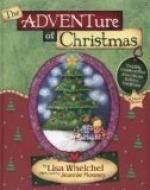“I should have thought so, and should not have felt disturbed, but for the reason that none of the neighbors’ geese had that peculiar call—that hornlike tone that I had noticed in mine.
“I went out of the door.
“The third goose looked like the very gander I had given Nathaniel. Could it be?
“I did not sleep. I rose early and went to the crib for some corn.
“It was a gander—a ‘wild’ gander—that had come in the night. He seemed to know me.
“I trembled all over as though I had seen a ghost. I was so faint that I sat down on the meal-chest.
“As I was in that place, a bill pecked against the door. The door opened. The strange gander came hobbling over the crib-stone and went to the corn-bin. He stopped there, looked at me, and gave a sort of glad “honk,” as though he knew me and was glad to see me.
“I was certain that he was the gander I had raised, and that Nathaniel had lifted into the air when he gave me his last recognition from the top of the hill.
“It overcame me. It was Thanksgiving. The church bell would soon be ringing as on Sunday. And here was Nathaniel’s Thanksgiving dinner; and brother Aaron’s—had it flown away? Where was the vessel?
“Years have passed—ten. You know I waited and waited for my boy to come back. December grew dark with its rainy seas; the snows fell; May lighted up the hills, but the vessel never came back. Nathaniel—my Nathaniel—never returned.
“That gander knows something he could tell me if he could talk. Birds have memories. He remembered the corn-crib—he remembered something else. I wish he could talk, poor bird! I wish he could talk. I will never sell him, nor kill him, nor have him abused. He knows!”
=Whittier’s Birthday=
JOHN GREENLEAF WHITTIER
Born December 17, 1807 Died September 7, 1892
Whittier is known not only as a poet, but as a reformer and author. He was a member of the Society of Friends. He attended a New England academy; worked on a farm; taught school in order to afford further education, and at the age of twenty-two edited a paper at Boston. He was a leading opponent of slavery and was several times attacked by mobs on account of his opinions.
=THE BOYHOOD OF JOHN GREENLEAF WHITTIER=
BY WILLIAM H. RIDEING
The life of Whittier may be read in his poems, and, by putting a note here and a date there, a full autobiography might be compiled from them. His boyhood and youth are depicted in them with such detail that little need be added to make the story complete, and that little, reverently done as it may be, must seem poor in comparison with the poetic beauty of his own revelations.




